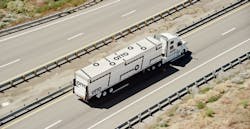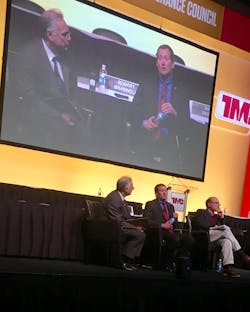Colorado officer recounts how Otto's autonomous beer delivery became a reality
ATLANTA. Mark Savage, deputy chief of the Colorado State Patrol, admits he knows much more about traffic laws than he does about engineering or autonomous technologies.
So when Otto approached the state about its now famous autonomous beer delivery in October 2016, he was initially skeptical. However, after extensive discussions and testing, he was won over for a very simply reason.
“We understood this technology … could save lives. And this is our bottom line,” Savage said during a panel discussion on automated driving during the Technology & Maintenance Council’s annual meeting.
In recounting the story of how the successful 120-mile delivery of Anheuser-Busch beer from Fort Collins to Colorado Springs became a reality, he pointed out there is no law in Colorado that explicitly prohibits what Otto was attempting to do. That was a main reason when Otto reached out, Colorado law enforcement felt it was important to engage with the company.
Savage detailed several testing hurdles the company successfully completed prior to getting the green light on the delivery.
During one test run, the truck struggled to remain in its lane around a construction zone and curved section of Interstate 25 near Mile High Stadium in Denver. Savage noted that while many passenger car drivers were also struggling with this area, he could not back Otto's project without performance enhancements.
Within weeks, he said, the company had tweaked the technology so it was able to navigate the same stretch with precision.
Later in the process, Savage said Otto completed five consecutive off-highway tests without disengaging the system – meaning there was never a need for any human engagement.
Throughout the months of testing, he said there were often reminders of the dangers that already exist on the highways.
During one last-night test with a large police escort surrounding the truck, one nearby car seemed to be driving erratically. The situation became so concerning, one of the escort vehicles broke away to pull over the car – and ended up arresting that driver for being drunk.
As for the actual shipment, a driver was in the seat and in communication with law enforcement the entire trip. No human interaction was required during the time on the interstate. Since this delivery and following a legal dispute with Waymo, Otto has since been merged into Uber’s Advanced Technologies Group.
During his presentation, Savage was cautious to overhype driverless trucks, and said many questions remain, such as who - or what - would receive a ticket from a police officer when there is an accident involving a vehicle in autonomous mode. Yet it was also clear that Savage’s experience with Otto left him convinced these emerging technologies would create safer highways in the years to come.
About the Author
Neil Abt
Neil Abt is a former FleetOwner editor who wrote for the publication from 2017 to 2020. He was editorial director from 2018 to 2020.

